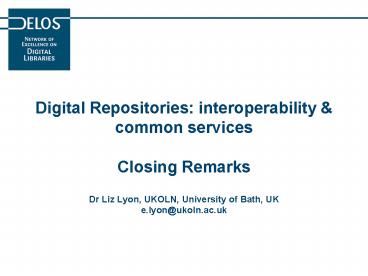Digital Repositories: interoperability - PowerPoint PPT Presentation
Title:
Digital Repositories: interoperability
Description:
Some points from the Crete workshop. Currently roles in ... Faculty issues B Awareness (Alma Swan survey) Policy issues (Ann Wolpert & Lorna Campbell) ... – PowerPoint PPT presentation
Number of Views:39
Avg rating:3.0/5.0
Title: Digital Repositories: interoperability
1
Digital Repositories interoperability
common servicesClosing RemarksDr Liz Lyon,
UKOLN, University of Bath, UKe.lyon_at_ukoln.ac.uk
2
Some points from the Crete workshop
- Currently roles in scholarly communications are
evolutionary - Need to have a more revolutionary approach
- Repositories within wider frameworks in context
- Repository activities across e-learning,
e-research and e-administration - Need to address architectural challenges, looking
for common abstractions - Repository reference model
- Inhouse or off-the-shelf?
3
Some points from the Crete workshop
- Different drivers conflicting requirement
- Maturity and robustness of existing tools
- Prototype development to extend functionality
- Migration of content between repositories
- Cultural organisational challenges
- Communication issues
- Between service providers and data providers
- Preservation strategies and risk analysis
4
JISC / SURF / CNI conference on Institutional
Repositories
- Survey of national IR developments
- Panels looking at fragmentation, content,
organisation and workflow, national policy - Keynotes (Tony Hey and Mark Kornbluh)
- 4 breakout sessions
- Technical infrastructure (Liz Lyon Herbert
Van der Sompel) - Faculty issues A Impact , citations rights
(Tim Brody Charles Oppenheim) - Faculty issues B Awareness (Alma Swan survey)
- Policy issues (Ann Wolpert Lorna Campbell)
- Commentary and close from Cliff Lynch
- Presentations will be on SURF Web site
5
Assuring permanent open access to the records of
science the humanities?
- Long term access to primary data
- Increasing data volumes from eScience and
Grid-enabled / cyberinfrastructure applications - Changing research paradigm data-driven science,
big science - Observational data, simulations, large-scale
experimentation, computations - Multi-media resources, statistical data,
surveys, geo-spatial data
6
Taxonomy of data collections
Evolution
- Research collections jumping robots
- Community collections Flybase at Indiana
(with UC Berkeley ) - Reference collections Protein Data Bank
- Source NSF Long-Lived Digital Data Collections
- Draft report March 2005
7
Repository evolution 1971 Research collection
lt12 files 2005 Reference collection gt2700
structures deposited in 6 months
8
JISC/SURF/CNI Technical Issues
- Scholarly communications, lifecycles and value
chains - Research data is diverse, increasing rapidly in
volume and complexity e-Science - Repository collections are dynamic and evolve
- Embedding in workflow is critical scholarly
communications, research practice, learning - Linking research data to publications and
learning - Knowledge services will generate new discoveries
based on repository content - Repository solutions must scale M2M processing
will become the norm - Complex digital objects are the norm.
9
JISC/SURF/CNI Technical Issues
- Federated repository architectures
- Repository registry proposed
- Object registry proposed
- Multiple persistent identifier schemes
- Multiple identifiers per object
- Name authority and author registries
- Terminologies across domains for meaningful
resource discovery - Rights expression languages
- Provenance and versioning
10
Presentation services subject, media-specific,
data, commercial portals
Searching , harvesting, embedding
Resource discovery, linking, embedding
Resource discovery, linking, embedding
Data creation / capture / gathering laboratory
experiments, Grids, fieldwork, surveys, media
Aggregator services national, commercial
Data analysis, transformation, mining, modelling
Learning object creation, re-use
Harvestingmetadata
Learning Teaching workflows
Research e-Science workflows
Repositories institutional,
e-prints, subject, data, learning objects
Institutional presentation services portals,
Learning Management Systems, u/g, p/g courses,
modules
Deposit / self-archiving
Deposit / self-archiving
Validation
Publication
Resource discovery, linking, embedding
Validation
The scholarly knowledge cycle. Liz Lyon, Ariadne,
July 2003.
Peer-reviewed publications journals, conference
proceedings
Quality assurance bodies
11
Next steps?
- Knowledge Extraction Semantic Interoperability
cluster - We need to share information about current
research interests, activities and projects more
effectively - Explore possibility of Delos database of research
activity - In partnership with others JISC???
- Initiate Delos forum using post-workshop mailing
list - Report on Digital Repositories
- Cluster Web site development
- Continue discussion and debate
- Greater integration of research activity
12
Thanks to many people.































